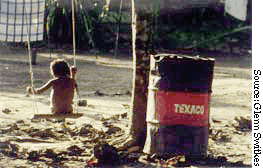
Texaco Tries to Move $1.5 Billion Pollution Suit Out of U.S Court
 |
|
|
(ENS) NEW YORK --
A
$1.5
billion pollution lawsuit brought against the giant oil
company Texaco by a group of Ecuadoran tribes
should be heard in Ecuadoran courts, not American courts,
a judge in Manhattan federal court heard on February 2.
Lawyers for the White Plains, New York based corporation had earlier opposed the case being heard in any court. Cristobal Bonifaz, a Boston based environmental lawyer who is a native of Ecuador, said the plaintiffs want the case heard by American U.S. courts because they have no faith in the justice that would be meted out by the courts of Ecuador. The Ecuadorian government depends heavily on oil revenues and its courts have no experience with tort law, Bonifaz argued. "This is an incredible catastrophe. They contaminated the land, they contaminated the rivers, they killed the fish and created a medical condition that is going to get worse in the years to come," Bonifaz said outside the courtroom where his clients appeared in their native apparel.
|
|
A
report published in 1991 by the National
Resources Defense Council, "Amazon Crude," a New York based environment
organization, estimated that Ecuadoran oil operations
discharged 4.3 million gallons of toxic wastes into the
Oriente's environment every day. Until 1990, Texaco
controlled 90 percent of these oil operations.
A later report by the New York based Center for Economic and Social Rights said that these wastes created a "potential health catastrophe." The report documented toxic contaminants in drinking water at levels reaching 1,000 times the safety standards recommended by the U.S. Environmental Protection Agency. Ecuadorean health workers reported increased stomach and intestinal problems, skin rashes, birth defects and cancers, illnesses that they believe to be related to the petroleum contamination. The case was filed on behalf of 30,000 Ecuadoran plaintiffs in November 1993 by a team of lawyers headed by Bonifaz and Joseph Kohn of Kohn, Naft and Graf of Philadelphia. Bonifaz said at the time, "Texaco can't be brought before international human rights tribunals and there is no chance of finding justice in Ecuador, so we filed a suit in its own backyard. We don't care how it's achieved, but Texaco must somehow be forced to make good on the damage it caused to the people and environment of the Oriente." U.S. District Judge Jed Rakoff dismissed the suit in 1997, ruling that Ecuadorean officials waited too long before deciding whether to continue opposing the suit or join the Ecuadorean tribes as a plaintiff against Texaco. The 2nd U.S. Court of Appeals reinstated the case in 1998. The appellate court ordered Judge Rakoff to decide where the case should be heard.
|
|
 A Texaco
statement released February 1 said, "Much of the
relief the plaintiffs seek -- the changing of Ecuadorian
environmental regulations, the remediation of oil
production sites operated by the state oil company and the
modification of Petroecuador's continuing practices -- can
only be obtained from Petroecuador and the Ecuadorian
government. The Ecuadorian government has said
unequivocally that it will not waive its sovereign rights
and allow a U.S. judge to dictate Ecuadorian laws and
practices. The fact of the matter is that the Ecuadorian
judicial system is fully capable of fairly adjudicating
this issue."
A Texaco
statement released February 1 said, "Much of the
relief the plaintiffs seek -- the changing of Ecuadorian
environmental regulations, the remediation of oil
production sites operated by the state oil company and the
modification of Petroecuador's continuing practices -- can
only be obtained from Petroecuador and the Ecuadorian
government. The Ecuadorian government has said
unequivocally that it will not waive its sovereign rights
and allow a U.S. judge to dictate Ecuadorian laws and
practices. The fact of the matter is that the Ecuadorian
judicial system is fully capable of fairly adjudicating
this issue."
"During its 26 years in Ecuador," the company said, "Texaco Petroleum acted responsibly, complied with all Ecuadorian laws and international petroleum industry standards, and used appropriate and accepted practices of the time. At the end of Texaco Petroleum's involvement with the consortium, Texaco Petroleum agreed to undertake a $40 million remediation program, designed with the Ecuadorian government, to close and remediate approximately 260 sites. That program has been completed and approved by the Ecuadorian government." The Coalition for Amazonian Peoples and Their Environment (CAPE) says Texaco left over 600 open-pit toxic waste sites in Ecuador. Antonio Jacanamijoy, head of the Coordinating Body for the Indigenous Organizations of the Amazon Basin, observes oil wastes being dumped into the local drinking water at an Amazon Coalition Workshop on the impacts of oil development. Texaco has a marketing subsidiary in Ecuador now but no current oil exploration or production operations of its own. The judge did not say when his ruling would be made public. Meanwhile, the day before in Ecuador, soldiers removed a group of over 300 people that had occupied an installation owned by U.S. oil company Atlantic Richfield Co. (ARCO). The protesters had stopped work at ARCO's installation outside the town of Puyo in the Amazonian province of Pastaza to demand that the national government spend $4 million to complete a road to Puyo.
Albion Monitor
February 15, 1999 (http://www.monitor.net/monitor) All Rights Reserved. Contact rights@monitor.net for permission to use in any format. |